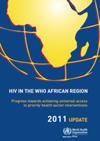Scaling up HIV/AIDS Services in the African Region: Progress Report
Brazzaville, 20 June 2011 -- The WHO Regional Office for Africa releases the Report "HIV in the WHO African Region: 2011 update - progress towards achieving the universal access to priority health sector interventions". The report calls on countries, international partners and donors to intensify actions to reduce the number of new HIV infections.
According to the report, impressive programmatic gains and political momentum achieved in the last Decade are important steps towards achieving universal access to HIV services, the effective elimination of mother-to-child transmission of HIV and the realization of the Millennium Development Goals.
Encouraging declines in HIV prevalence have been reported among people aged 15-24 years in countries of the Region. Countries with data on sexual behaviour have also reported increase in condom use to prevent HIV transmission, increased age at sexual debut and fewer young people reporting multiple sexual partners. Medical male circumcision is now a major additional HIV prevention strategy for the health sector. It has already been scaled up in 12 out of 13 priority countries in the Region.
In 2009 alone, almost 1 million additional individuals started receiving life-saving antiretrovirals (ARVs). By the end of 2009, an estimated 4 million were receiving antiretroviral therapy in the Region. However, the coverage for HIV services is not universal with only 37% of individuals in need currently receiving ARVs, and 54% of pregnant women living with HIV receiving ARVs for preventing mother to child transmission of HIV.
‘’This implies that, in addition to accelerated efforts, new models of providing care are necessary to enhance access and effectiveness of services’’, said WHO Regional Director for Africa, Dr Luis Gomes Sambo. He called for enhanced collaboration between HIV and TB programmes in service delivery, and stronger links between HIV programmes and those for maternal, newborn and child health.
Increased investments in HIV/AIDS response by national governments and partners, namely the Global Fund to Fight AIDS, Malaria and Tuberculosis and the United States President’s Emergency Plan for AIDS Relief, have contributed to the progress being made in the response to HIV/AIDS in the African Region.
The United Nations General Assembly Political Declaration on HIV/AIDS in 2006, the Abuja declaration in 2006, the declaration of 2006 as a Year of Acceleration of HIV Prevention in the African Region by African health ministers and the adoption of the Brazzaville Commitment on Scaling-up towards Universal Access to HIV and AIDS Prevention, Treatment, Care and Support in Africa by 2010 have all provided the necessary impetus to efforts aimed at stopping the HIV epidemic in the Region.
The adoption of the Ouagadougou Declaration on Primary Health Care and Health Systems, which reaffirmed the principles of the Declaration of Alma-Ata of September 1978, has forged a regional consensus on the need to further integrate the delivery of HIV/AIDS related care within the context of broader health systems strengthening.
The Regional Report proposes actions that will help countries scale up HIV interventions. These include HIV testing and counselling, providing treatment and care, preventing mother-to-child transmission, carrying out male circumcision and ensuring blood safety. The report also identifies enabling factors and challenges in achieving universal access and accelerating progress towards the attainment of the Millennium Development Goals.
Countries need to continue mobilizing adequate funding from domestic and external sources to keep pace with the increase demand for HIV services. Thirty years into the HIV/AIDS epidemic, sub-Saharan Africa continues to be the part of the world most affected by the HIV/AIDS epidemic with an estimated 22.5 million adults and children living with HIV in sub-Saharan Africa.
For more information, please contact:
Technical contact: Dr Emil Asamoah-Odei, Tel: + 47 241 39277; E-mail: asamoahodeie [at] afro.who.int (asamoahodeie[at]afro[dot]who[dot]int)
Media contact: AFRO Communications Team: Tel: +47-241-39378/ 39420/39352/39382; e-mail: cam [at] afro.who.int (cam[at]afro[dot]who[dot]int)



